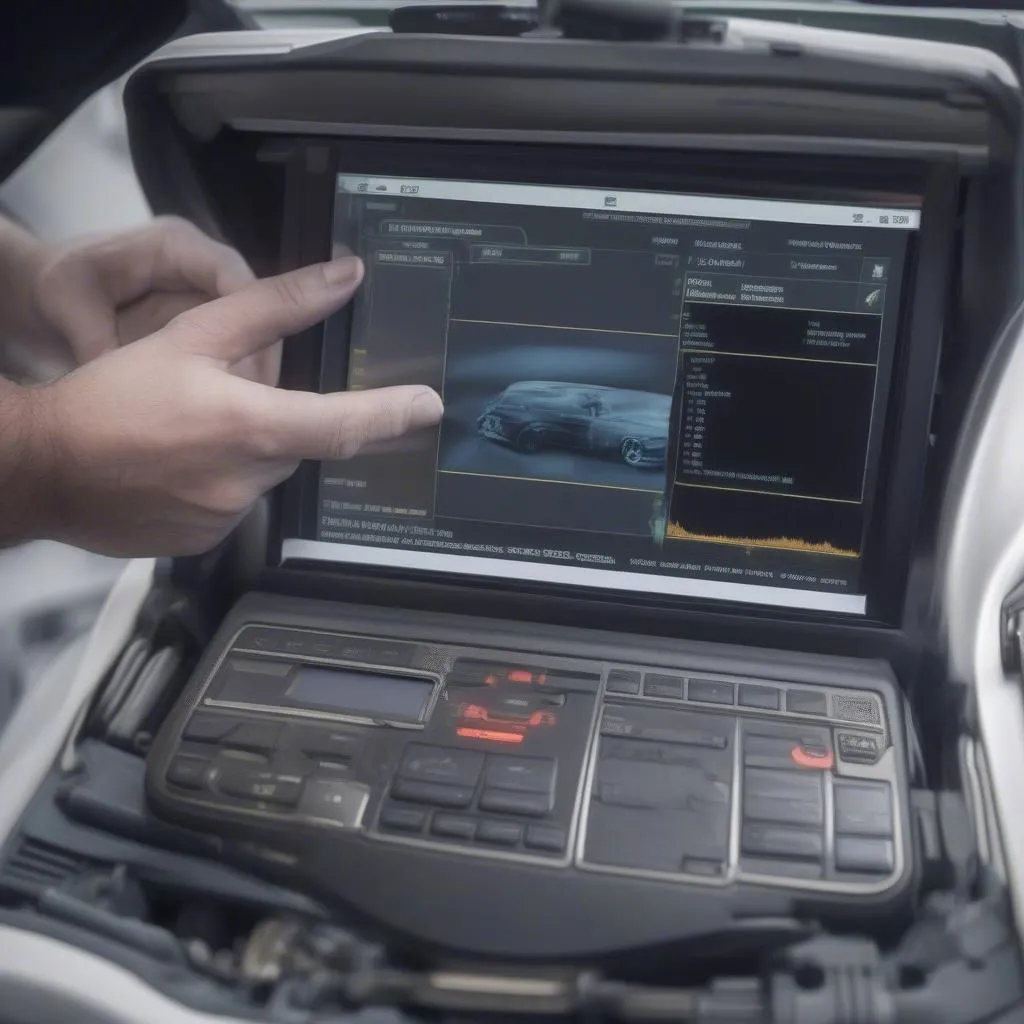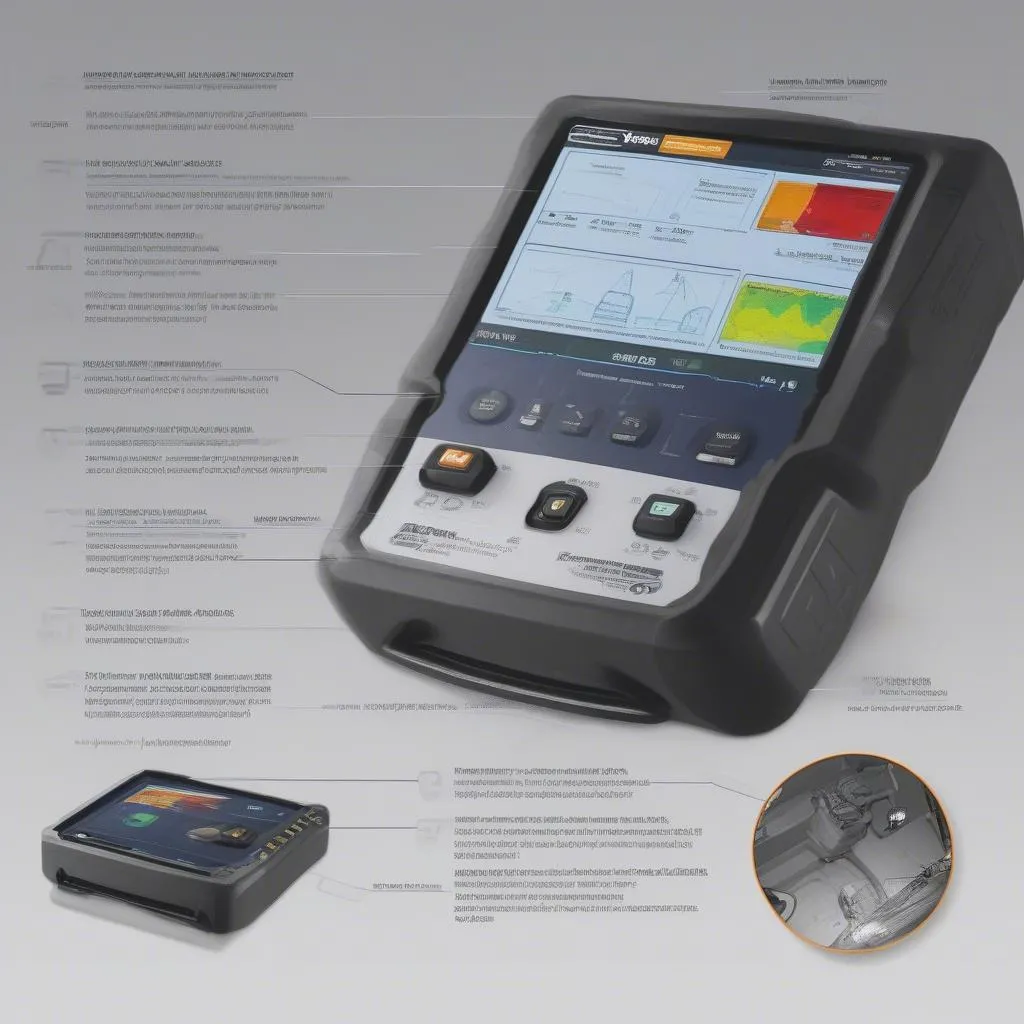Imagine yourself under the hood of a car, surrounded by a maze of wires and sensors, trying to pinpoint a problem. You need to delve deep into the car’s electrical system to find the root cause, but the only tool you have is a basic multimeter. This is where an auto scan tool comes in. It’s your key to unlocking the secrets of your car’s computer system and getting to the bottom of issues quickly and efficiently.
Why Choosing the Right Auto Scan Tool Matters
Choosing the right scan tool is crucial for anyone who works on cars, from professional mechanics to DIY enthusiasts. Whether you’re trying to diagnose a check engine light, reset a service light, or perform more complex repairs, a quality scan tool is an indispensable tool. It allows you to:
- Read and interpret diagnostic trouble codes (DTCs): These codes give you valuable clues about what’s wrong with your car.
- Access live data streams: This lets you monitor real-time sensor readings and see how different systems are interacting.
- Perform various tests: From activating components to checking actuator performance, a scan tool can save you time and frustration.
- Clear codes and reset service lights: Once you’ve fixed a problem, a scan tool can reset the system and clear the fault codes.
What to Consider When Choosing an Auto Scan Tool
Now that you understand the importance of a scan tool, let’s dive into the factors you need to consider when making your purchase:
1. Vehicle Compatibility:
This is the most important factor. You need a scan tool that is compatible with the specific make, model, and year of your vehicle. Scan tools vary in their coverage, with some supporting only a handful of car brands, while others cover a wider range of vehicles.
For example, if you mainly work on European cars, you’ll want a scan tool that is specifically designed for European vehicles.
 European car scan tool
European car scan tool
Many scan tools support different protocols, such as OBD-II, J1850, and CAN, which are used to communicate with the car’s computer system. Make sure the scan tool you choose supports the protocols used by your vehicle.
2. Features:
Scan tools offer a range of features, so it’s essential to consider what you need and what you’re willing to pay for. Some common features include:
- Basic code reading and clearing: This is the most basic functionality.
- Live data streaming: Allows you to monitor real-time sensor readings and see how different systems are interacting.
- Advanced diagnostics: May include features such as bi-directional controls, actuator testing, and service light resets.
- Special functions: Some scan tools offer special functions like programming keys, calibrating sensors, and performing adaptations.
**
 Advanced Scan Tool Features
Advanced Scan Tool Features
For example, if you’re a professional mechanic, you’ll likely need a scan tool with advanced features, while a DIY enthusiast might get by with a basic scan tool.
3. User Friendliness:
A user-friendly interface is essential, especially if you’re not a professional mechanic. Look for a scan tool with a clear and intuitive menu, easy-to-understand instructions, and a helpful display. Some tools offer features like color-coded displays, graphical representations of data, and even video tutorials.
4. Price:
Scan tools range in price from a few hundred dollars to thousands of dollars. Consider your budget and the features you need before making a purchase. Remember, you don’t always have to buy the most expensive scan tool to get the job done.
5. Brand Reputation:
Choose a scan tool from a reputable brand with a proven track record of quality and reliability. Look for brands with excellent customer support and a warranty.
FAQs:
Q: What are some popular brands of scan tools?
A: Some of the most popular brands of scan tools include Autel, Launch, and BlueDriver. These brands offer a wide range of scan tools for different needs and budgets.
Q: Can I use a scan tool on any car?
A: No, scan tools are not universal. They are designed to work with specific makes and models of vehicles.
Q: What is OBD-II?
A: OBD-II stands for On-Board Diagnostics II. It is a standardized system for monitoring the emissions and performance of vehicles. Most cars manufactured after 1996 are equipped with OBD-II.
Q: Can I use a scan tool to reset my check engine light?
A: Yes, a scan tool can be used to reset your check engine light. However, it’s important to note that simply resetting the light won’t fix the underlying problem.
Choosing the Right Scan Tool for You:
To help you decide which scan tool is right for you, consider these questions:
- What make, model, and year of car do you work on?
- What are your primary needs for a scan tool? (Basic code reading, advanced diagnostics, etc.)
- What is your budget?
Once you have answered these questions, you can start researching specific scan tools. Check out online reviews, forums, and compare features and pricing before making a decision.
Get Expert Support:
We understand that choosing the right scan tool can be a daunting task. If you need help selecting the right tool for your needs or if you have any questions about scan tools or diagnostics, don’t hesitate to contact us. We are here to help you find the best solution for your automotive diagnostic needs.
Connect with our experts via WhatsApp: +84767531508
Conclusion:
Investing in a quality auto scan tool is a smart move for anyone who works on cars. It can help you diagnose problems quickly, save you time and money, and prevent frustration. By considering the factors discussed above, you can find a scan tool that meets your specific needs and helps you keep your car running smoothly.
Don’t forget to share this article with other car enthusiasts!
Explore other informative articles on our website:


